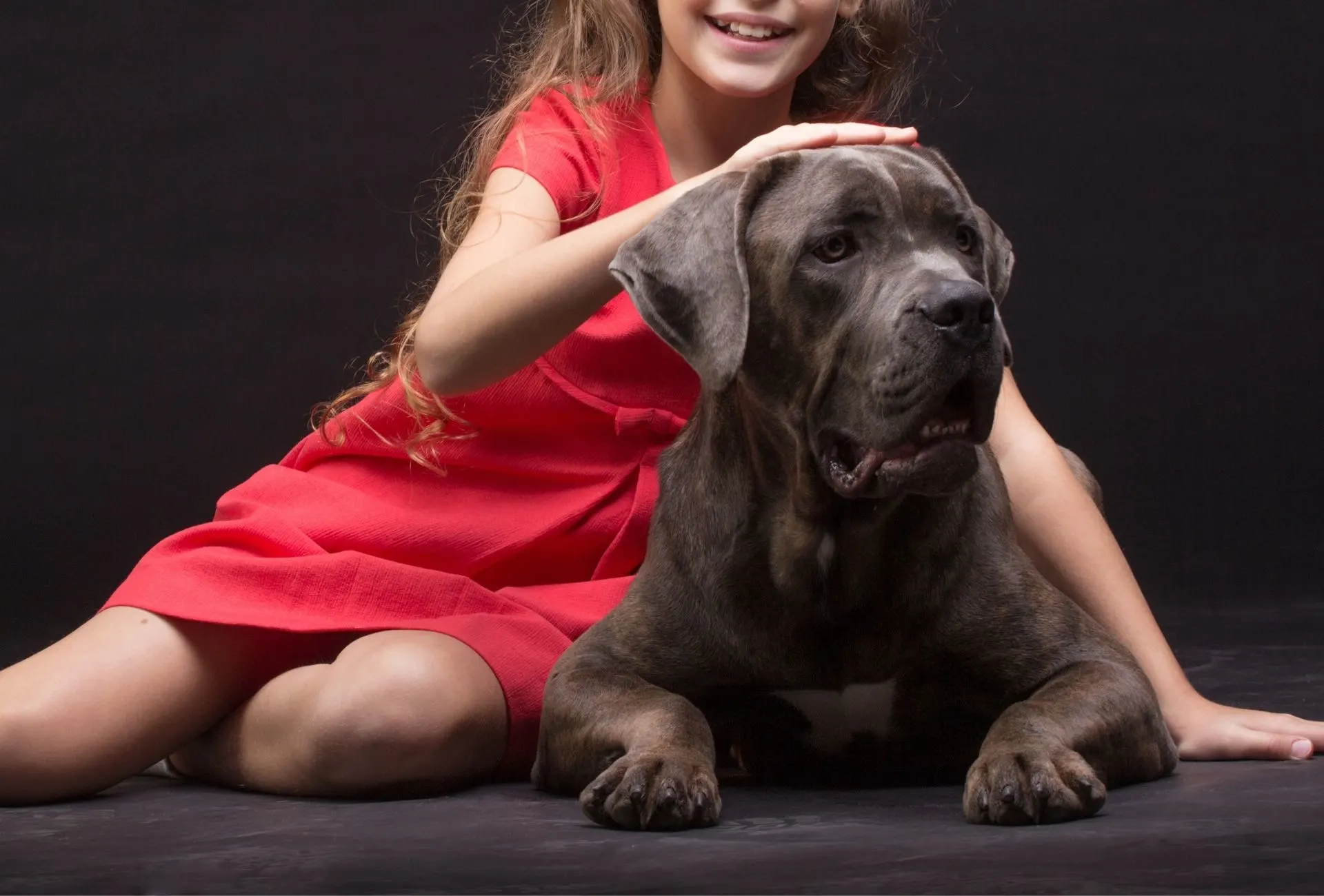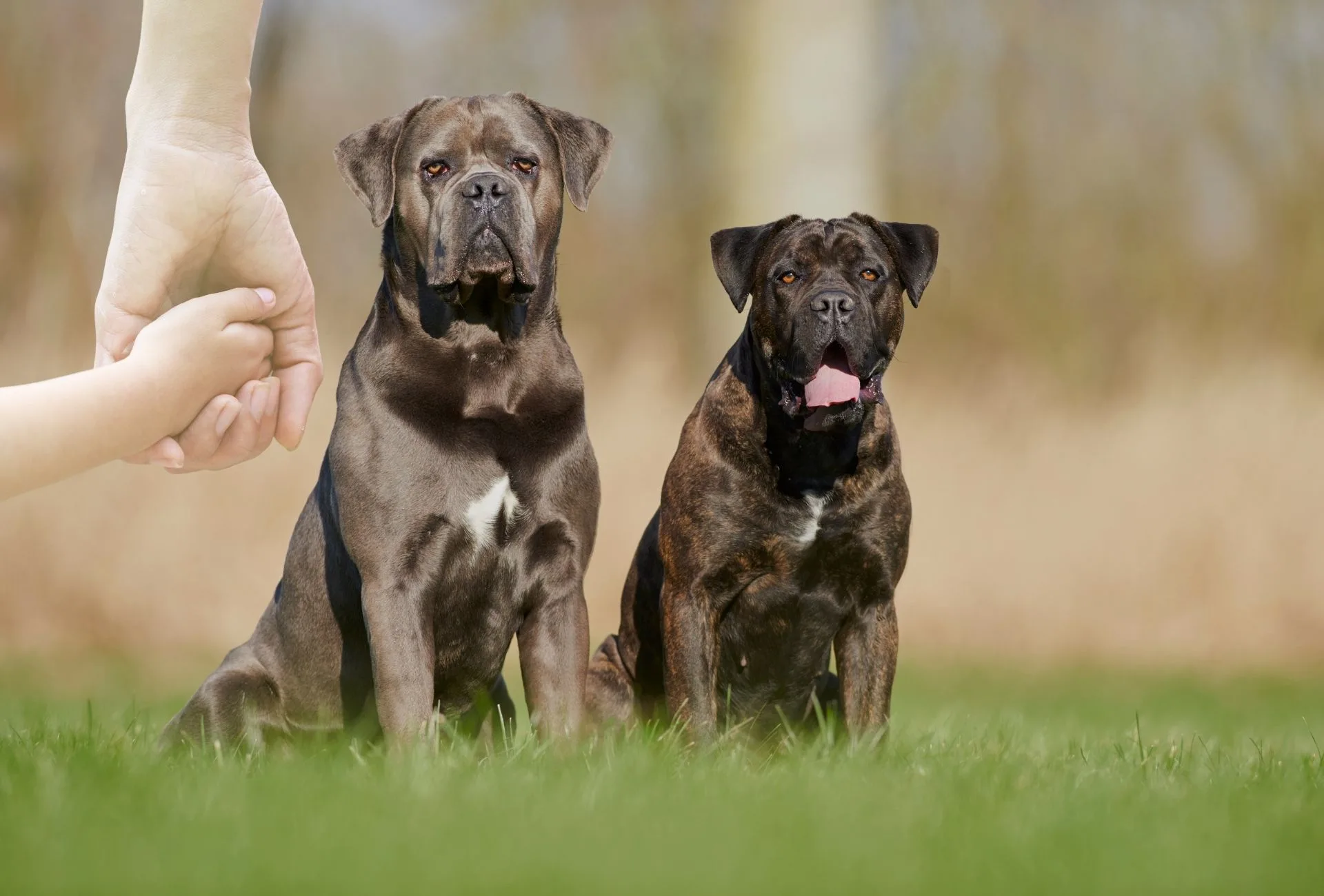Before bringing a particular dog breed into your home, you’ll want to know whether or not it’s the right breed for your family, especially if you have children at home or if offspring is planned in the foreseeable future.
What would you normally do? Skimming through breed standards comes to mind.
Or perhaps muddling through strange scorecards ascribing strict points on a scale of 1-5 for each behavior/lifestyle category.
The worst thing that can happen is that you stumble over plain wrong information by people who never owned a big dog.
You want a trusted resource.
However, people who own this breed themselves and proclaim their greatness (or the contrary) in forums may not be the most objective judge.
I’ve researched extensively about this breed’s history and it’s probably among my most favorite guardians.
I myself own a Rottweiler, but my second choice would probably be a Cane Corso.
Let me tell you why and why this breed might not be the perfect fit for you.
Are Cane Corsos Good With Children?
Yes, a well-socialized Cane Corso can be great with children if raised with them early on.
When the Cane Corso breed was restored in the 1970s, they were actually living among families on farms most of the time and got along with kids and other animals just fine.
While they’re rumored to originally be Roman war dogs, they were used for a wide variety of work in the 1970s, and one of these tasks was, as many of you know, guarding.
Nowadays, this dog’s circle of enthusiasts mainly consists of people interested in owning a guard dog.
As always, there are bad breeders raising this breed in a way that was neither their original purpose nor is it unlocking their full potential.

The Cane Corso’s majestic appearance may seem like it’s an indication of how fierce this breed can be and how unsuitable this seemingly serious dog might be for kids.
Don’t get me wrong, the Cane Corso can look intimidating to smaller children or even teenagers.
Perhaps these dogs are intimidating to most adults.
Compare the big black Cane Corso to a friendly-looking yellow Lab and see who comes out on top when checking for irritated children in the streets.
While kids are inherently unprejudiced against dogs, their negative attitude is often influenced by their parents.
I’ve seen it happen, parents drag their kid frantically out of the way, get a panicked voice or whatnot just because a dog with a big head walks on the same surface of the earth as they do.
However, once kids become familiar with the breed they usually love these big boys and gals.
Why are Cane Corsos good for kids?
Cane Corsos are simply great guardians, very affectionate, and have a high tolerance threshold with children if trained and socialized properly.
This dog is not going to raise himself though and you need to invest serious time, effort, and money into this breed.
Example time: A raw diet for my 100-pound (45kg) Rottie costs me around $250/month, are you ready to commit to a dog that can weigh up to 150 pounds (68kg)?
Are Cane Corsos Safe Around Children?
Whether or not a Cane Corso is safe around children depends a lot on how he has been raised and whether or not he’s familiar with children.
If you’re just rescuing a Corso from a shelter, it’s possible that he has a) negative experiences with children or b) they’re totally unfamiliar and thus possibly strange to him.
Think about it, any dog may be antsy or irritated by all the loud noises kids make, get startled by their sudden moves, or plainly dislike them touching and grabbing the tail, ears, and invading personal space in general.

To get your Cane Corso to live comfortably with your kids, you need to desensitize him to being touched on all body parts as well as having the kids around 24/7.
While teaching a puppy the canine 101 may be a demanding task, retraining a rescue while juggling your kids at home can be an insurmountable challenge if you don’t put in the time and effort.
Are you willing to commit to this breed and fall in love as I did?
Then the Cane Corso will be quite safe around children if you raise the dog with your kids (or just expose him to children in general).
No matter what, don’t leave your dog and child unsupervised, even if you 100% trust your dog.
Kids can make sudden moves or experiment with stuff your dog might not appreciate.
Keep in mind, kids are not masters of reading canine body language.
Supervise them to avoid children ignoring all the various warning signs well-trained Cane Corsos give (turning head away, licking, trudging away, hackles, barking, growling).
Are Cane Corsos Good With Babies?
Cane Corsos can be gentle giants with babies if taught how to properly interact with them.
However, a less confident Corso might not accept the baby partly due to a failed introduction to the baby, and in part due to a lack of exercise and affection that sadly often tends to happen in families when the baby suddenly becomes the priority.
However, if raised and trained properly, your Corso can easily end up loving the baby to bits and be his or her greatest companion.
Beware: Cane Corsos are incredible lovebugs and you might need to check in to make sure they know they’re not intended to be lapdogs for babies.
Recommended Reading: Cane Corso Behavior Developmental Stages (you’d be surprised how much they have in common with tiny humans).
Possible Issues Cane Corsos With Kids
There are various instances where a Cane Corso might not be the best choice for your home.
Some of these reasons are due to a lack of commitment on the owner’s side, but others are simply breed traits that many breeds share but can be especially dangerous with such a large dog.
Most of these problems should not surface if you train and socialize your puppy properly.
These issues pop up far more often with rescues who’ve had negative experiences previously.
- You often have parents with their kids over for playtime and your Corso is showing behavioral issues
- Your Cane Corso won’t let visitors like children enter in the first place
- Extremely rough play with your toddler
- Unable to supervise baby and dog
- Unable to provide regular training, exercise, and affection for the Cane Corso
- Not everybody in your family (including your kids) is on the same page when it comes to training
While a Cane Corso can definitely be taught how to interact with kids properly (even their parents) doing this inside the house requires a whole other set of training.
As so often, you need to train in the environment you plan on using your dog in which is your home.
This could prove to be a struggle since the Cane Corso is known to be a very territorial breed (remember, they were also used for guarding properties on farmland and smaller villages).
You want your Cane Corso to be a part of the family and play with the kids so proper training is a must on your to-do list.
Also, no matter how good your dog is with babies or a small toddler, do not leave them unsupervised as accidents can always happen.
Furthermore, too many people think that the child-dog relationship will just work on its own without any external attention or work.
This is not the case and your kid needs to be an active part of the training process.
Pretty handy to have your kid be able to issue a command if they don’t want to play anymore, isn’t it?
Children should also get familiar with training to make sure the dog will listen to their commands as they age.
If your child is scared of dogs in general, check out my list of perfect dogs for scared children.
That being said, you can get your child used to any dog breed but try to introduce other big dogs first instead of immediately jumping to getting your own dog.
Raising your kid with a puppy instead of an adult dog or even senior is generally easier for their bond and children might love growing up with your Cane Corso but keep in mind that it’s double the workload.
Puppy blues is serious on its own and gets even worse if you have a kid in the other room throwing a tantrum.
Do you have a Cane Corso? Share your experiences with children and your dog in the comments below!
Disclaimer: This blog post does not substitute veterinary attention and does not intend to do so. I am not a veterinarian or pet nutritionist. If your dog shows any sign of illness, call your vet.